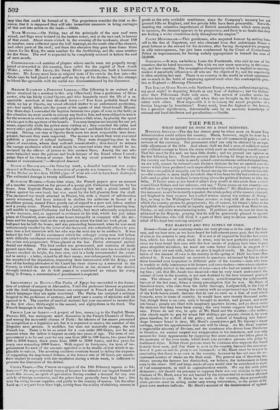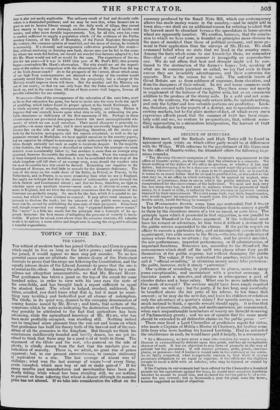THE PRESS.
WHAT MIGHT BE DONE BY A TORY MINISTRY.
Montallo Joules:tr.—The day has almost gone by when even an honest Tory Administration could relieve the country. Much, however, might be done by a resumption of the navigation laws—a return to our ohl commercial puliev—aila a revision of the currency. But pc-rmanent relief can only he attained by an equitable adjustment of the debt. And where shall we find a man of sufficient mond and political courage to brave the storm which such au undertaking would create? That this must be the end. we have little doubt ; and we ground our opinion on the few following facts. From the poverty that is fixing its fangs in every part of the country our home trade is nearly ruined—our enormous national expenditure, we are told, cannot be reduced—our Dictator declares he has no control over the causes which have produced such unparalleled distress—a regency is staring us in the face—no political integrity can be found among the earthly potsherds who rule us—the country is more ready for cabals than it has been for the last century and a half—and no giant in intellect is seen rising above the political horizon to hike the helm. If Tories were at the head of affairs they would at this crisis draw a circle round Great Britain and her colonies, and say, " These compose our country—no will allow no foreign commerce to interfere with either." Sir. Husk isson's de,tructire measures would be instantly repealed, the whole policy of the country changed, and England in time resume her exalted station among the nations of Europe. But, so long as the Wellington Cabinet remains. so long will all the evils under -which the country groans be perpetuated; for, of course, his Grace's letter to the Spitalfields deputation would be equally applicable to a petition from Manchester, Paisley, or any other manufacturing town. If petitions are to be sent let them be addressed to his Majesty, praying that he will be graciously pleased to appoint Cabinet Ministers who will think it a part of their duty to devise means for the. relief of his loyal but starving subjects I
THE HARVEST AND THE SUPPLY OF CORN.
Gross—Some of our contemporaries are very gloomy as to the state of the harvest, and we hear new, as we have heard for half-a-dozenyears past, that the stork of corn in the country is very short. It is not at all impossible that this last assertion, which has been often made in error, may be now perfectly correct; hut since we have found that men with the best means of judging have been in past years altogether mistaken, we must see some better evidence in support of it than we have yet met with, before we give it implicit credit. Mr. Jacob's calculation of the amount of corn in the country in the spring of 1828 has been often referred to. It was founded on answers to questions addressed by him to about three hundred corn inspectors in different parts of the country—men who were in weekly or daily intercourse with farmers and corn-dealers—men whose attention was habitually turned to the amount of corn—men who had no interest in deceiving him ; yet, that Mr. Jacob was deceived—that he very much under-rated the amount of corn in the country, is not now doubted by the best-informed practical men. Tile absence of anything like scarcity, notwithstanding the unfavourable harvest of the last year, forms a strong presumption that he was. Mr. Hunt, of Stamford-street, who rides from the Belle Sauvage, Ludgate-hill, to the City of Bath and back again, viewing the country with an experienced eye from the top of the York-house coach, declares that he saw no corn on a line of road where formerly, even in times of scarcity, he would have seen twenty thousand sacks. Yet, though there is no corn, corn is brought to market, and ground, and made into bread ; people are filled with imaginary quartern loaves, and go about under the delusion that they have been eating; the very horses suppose they have had oats. Prices do not rise, in spite of Mr. Hunt and the weather,—the millers, who clearly ought to pay for wheat 180 shillings per quarter, obtain it, by seine gross injustice, for a third of the price; and, instead of breaking into bakers' shops because bread is dear, Mr. Hunt's countrymen pelt Mr. Gurney's steam carriage, under the apprehension that oats will be cheap. As Mr. Hunt vouches a respectable attorney of Devizes, and the coachman who drives from Sherborne to Overton, we cannot suspect any exaggeration in his statement, and can only account for these appearances by supposing that some change has taken place in the economy of the corn trade, which leads into mistakes persons who judge by traditional signs. Either those persons must he mistaken who suppose that bread is made from corn, and that there is corn in the country, because the consumption of it goes on and its price is not increased : or Mr. Hunt must be in error in concluding that there is no corn in the country, because he has not seen the accustomed number of stacks on the Bath road. The general use of threshing machines among the farmers has diminished, we believe, the inducement to keep corn in the straw, Old and large stacks of corn would now be considered as signs of had management, as well as superabundant wealth. We say this with great deference ; nor should we presume to suppose there was any mistake in the conclusions of Mr. Hunt, were we not backed by the circumstantial evidence aflordect by the dealers in corn. If there be no corn in the country, these proverbially acute persons must be acting under very wrong information, as the prices at the great corn markets indicate. Mr. Hunt's account of the deterioration of agricul.
tore is also not easily explicable. The ordinary result of foul and slovenly cultivation is a diminished produce; and we may be sure that, when farmers are so poor as not to bestow lhbour enough on the daily work of tillage, they cannot have money to lay out on drainage, enclosure, the breaking up of heaths and wastes, and other more durable improvements. Yet, for all this, corn has come to market sufficient to supply a population which (if the evidence of the Parliamentary Census, of the Bills of Mortality, of the Parish Registers throughout the country, the common opinion of mankind, and the sense of seeing, be trusted) is increasing. If a slovenly and inexpensive cultivation produced this result— that, without enclosing or draining new land, eleven men can be fed in the country where ten were fed before, we should not wonder that farmers adopted it ; but this Mr. Hunt would not tell us would be the case. The experience of the nation for ten years—if it was in 1819 (the year of Mr. Peel's Bill) that poverty began—contradicts Mr. Hunt's observation. But why should we set the experience of the nation in comparison with the observations of Mr. Hunt from the top of the York-house coach ? As to the prospects of the harvest, about which some of our high Tory contemporaries are alarmed—a change of the weather would certainly mend them (not the writers, but the prospects), but a change of the .11ittistry would improve them still more. But the weather and the Ministry are out of our reach ; so that we can only hope that the Duke and the clouds may break up, and in the mean time, till one of these-events shall happen, foresee all possible calamities for our country.
STANDARD—One of the consequences of the relaxation of the corn laws, even so far as that relaxation has gone, has been to invite into the corn trade tile spirit of gambling, which before found its proper sphere at the Stock Exchange, wit its whole mystery of iniquity, misrepresentation, forgery, and lying. Hence it happens that one scarcely knows upon what data to rely, in estimating the pro bable abundance or deficiency of the first necessary of life. Perhaps in these circumstances our provincial newspapers furnish the most unexceptionable witnesses of which we can avail ourselves. Their moral character is generally re spectable,—in many cases high; and it must nearly universally happen that their interest lies on the side of veracity. Rejecting, therefore, all the stories put forth by the London newspapers, and the reports circulated, as well as the ap
pearances created at Mark,lane, we have applied ourselves to the country papers,
and we regret to be obliged to announce a result unfavourable to sanguine expectation, though certainly not such as ought to inculcate despair. In the majority
of the districts, the wheat crop is described as rather below the average—in some districts even considerably below it ; but nowhere is more than an average crop promised, however favourable the weather may becothe. From the composition of these integral testimonies, therefore, it is to be concluded that the crop of the whole kingdom will fall short of an average crop, even should the weather take the most favourable turn that could be desired. Extending our inquiries to the Continent of Europe, we find little to console for the domestic deficiency. The state of the crops on the south shore of the Baltic, in Poland, in Prussia, in the Netherlands, and in France, is no more promising than what we see in England. Nor ought we-to forget that this is the second of unfavourable years through the whole British and Continental circuit ; and that we have, therefore, no right to calculate upon any auxiliary reserve—none such, as is obvious to every one, exists in England, and we have the strongest assurances that the granaries of the Continent arc perfectly empty. So much for the fact, which it is painful to announce' but which it were criminal to conceal. It may affect some interests injuriously to disclose the truth ; but the interests of the public never were, and never can be, served by withholding the true state of their prospects. It has been well, though somewhat too strongly said, that "expected famine never comes." The " never" is a little too. much, but the principle that a foresight of its approach furnishes the best means of mitigating the pressure of scarcity is incontestible. If prices be raised, even above what the occasion warrants, the valuable result is to enforce a more active and frugal care in saving the crop, and to obviate a wasteful expenditure.



















 Previous page
Previous page